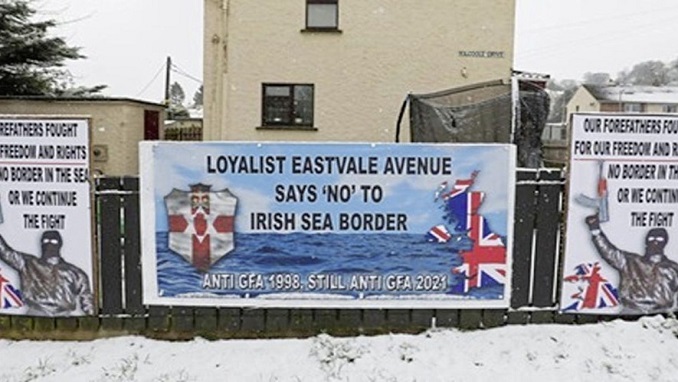Loyalist paramilitary organisations wrote to Prime Minister Boris Johnson that they are withdrawing their support for the Good Friday (Belfast) Agreement, The Irish News reports.
The Loyalist Communities Council said the groups were temporarily withdrawing their backing of the agreement amid concerns about the contentious Northern Ireland Protocol governing Irish Sea trade post-Brexit. The groups added, however, that unionist opposition to the protocol should remain “peaceful and democratic”.
The letter sent to Mr. Johnson said their stance on the Good Friday Agreement would continue until amendments are made to the protocol to ensure “unfettered access for goods, services, and citizens throughout the United Kingdom”.
“If you or the EU is not prepared to honour the entirety of the agreement then you will be responsible for the permanent destruction of the agreement,” the letter added.
The UK and the EU are currently in talks over repairing issues related to the Northern Irish Protocol, included in the Brexit agreement, which is designed to prevent the need for a hard border on the island of Ireland.
Brexit Brings Border Issues
Northern Ireland retains EU single market and customs union regulations, unlike the rest of the UK after Brexit, in order to avoid misalignment between the two sides of the Irish border. This draws an effective customs border down the Irish Sea and places certain checks on specific goods moving between Great Britain and Northern Ireland.
Unionist lawmakers in Stormont believe the Northern Ireland protocol runs counter to British law as it creates trade barriers between Northern Ireland and the rest of the UK. Northern Ireland Secretary Brandon Lewis recently said that the grace period, where post-Brexit restrictions and checks across the Island of Ireland are not fully implemented, would be extended at least until 1 October, drawing criticism from Brussels.
European Commission Vice-President Maroš Šefčovič stated that the move amounts to a violation of substantive provisions in the Northern Ireland protocol.
EU finance chief Mairead McGuinness said Britain’s decision to make unilateral changes to the Brexit arrangements on Northern Ireland raised questions over whether “Global Britain” can be trusted in future trade negotiations. McGuinness has warned that there are “voices” in Northern Ireland who don’t want a Protocol.
“They want trouble.” Ms McGuinness told RTÉ Radio’s Morning Ireland that trust was required in talks, but that was difficult when one party left the room “to do their own thing.”
Ms McGuinness said that the UK was negotiating with itself rather than with the EU and there needed to be respect on both sides. Businesses in Northern Ireland needed solutions, “we’re working on it,” she said. The UK’s behaviour was not appropriate and had to be “called out”, it would also raise questions about global Britain and how they would behave in the future with other global partners.
An agreement for an extension had been reached last December after lengthy negotiations, added Ms McGuinness, but there were voices in Northern Ireland who didn’t want a solution. “They want trouble.” The European Commission wanted to address the problems, which had been created by Brexit.
“We’re trying to resolve a problem we didn’t create, it was caused by Brexit.”
The political realities of the UK’s unilateral action will have to be separated from the practical realities being faced on the ground by Northern Ireland businesses, she said.
“We will never get the right solution if the two parties don’t agree on a way forward.”
Talks would continue, there was no way that they couldn’t, she said, but the atmosphere was going to be very different now.
“We will be the adults in the room.”
The 1998 Good Friday Agreement, also known as the Belfast Agreement ended decades of violence in conflict-torn Northern Ireland, establishing devolved power-sharing in the area and a demilitarised Irish border.
